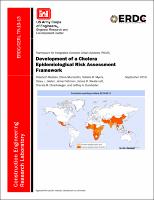Please use this identifier to cite or link to this item:
https://hdl.handle.net/11681/34162Full metadata record
| DC Field | Value | Language |
|---|---|---|
| dc.contributor.author | Bastian, Elizabeth G. | - |
| dc.contributor.author | Munaretto, Claire | - |
| dc.contributor.author | Myers, Natalie R. D. | - |
| dc.contributor.author | Baxter, Carey L. | - |
| dc.contributor.author | Fishman, Jamie | - |
| dc.contributor.author | Westervelt, James D. | - |
| dc.contributor.author | Ehlschlaeger, Charles R. | - |
| dc.contributor.author | Burkhalter, Jeffrey A. | - |
| dc.date.accessioned | 2019-09-23T18:28:51Z | - |
| dc.date.available | 2019-09-23T18:28:51Z | - |
| dc.date.issued | 2019-09 | - |
| dc.identifier.govdoc | ERDC/CERL TR-19-13 | - |
| dc.identifier.uri | https://hdl.handle.net/11681/34162 | - |
| dc.identifier.uri | http://dx.doi.org/10.21079/11681/34162 | - |
| dc.description | Technical Report | - |
| dc.description.abstract | This report presents technical explanations and specific enumerations for a cholera risk framework developed as a part of a multi-year project funded by the Army Research, Development, Test and Evaluation Pro-gram. This effort employed a novel data-conflation technology called the Framework for the Integration of Complex Urban Systems (FICUS), which uses a broad base of peer-reviewed research on established indicators of sociocultural or health-driven risk conditions of interest for intelligence or threat analysis in a given region. Researchers performed a specialized case study that incorporates results and data from previous programmatic work, including FICUS development and an existing theoretical humanitarian crisis (HC) framework. New data required for this framework included identification of conditions for contracting cholera, micro-survey data from global resources, and a digital population model that matches the survey data to existing population census data. The cholera framework research succeeded in using relevant microdata from the HC framework, then manipulating the HC framework to better inform cholera risk modeling. In general, the use of risk-analysis frameworks with FICUS is intended to produce case studies that provide non-obvious insights to the user while accounting for and reducing data gaps and uncertainties. | en_US |
| dc.description.sponsorship | United States. Office of the Assistant Secretary of the Army for Acquisition, Logistics, and Technology. | en_US |
| dc.description.sponsorship | Military Facilities Engineering Technology Program (U.S.) | - |
| dc.description.tableofcontents | Abstract .......................................................................................................................................................... ii Figures and Tables ........................................................................................................................................ iv Preface ............................................................................................................................................................. v 1 Introduction ............................................................................................................................................ 1 1.1 Background ..................................................................................................................... 1 1.1.1 FICUS demographic models ................................................................................................ 2 1.1.2 Humanitarian crisis framework .......................................................................................... 6 1.1.3 Cholera: an epidemiological overview ................................................................................ 8 1.2 Objective .......................................................................................................................... 9 1.3 Approach ......................................................................................................................... 9 2 Developing the Framework ............................................................................................................... 10 2.1 Input data ...................................................................................................................... 12 2.2 Risk value ...................................................................................................................... 13 2.3 Weights .......................................................................................................................... 14 2.4 Unknown components .................................................................................................. 14 2.5 Roll-up computation ..................................................................................................... 15 2.5.1 Favorability functions ........................................................................................................ 15 2.5.2 Quantifying errors and uncertainty ................................................................................... 16 3 Conclusion ............................................................................................................................................18 References ................................................................................................................................................... 19 Acronyms and Abbreviations .................................................................................................................... 27 Appendix A: Metadata for Cholera Framework and Components .................................................... 28 Report Documentation Page (SF 298) ................................................................................................ 294 | - |
| dc.format.extent | 302 pages / 45.69 Mb | - |
| dc.format.medium | PDF/A | - |
| dc.language.iso | en_US | en_US |
| dc.publisher | Construction Engineering Research Laboratory (U.S.) | en_US |
| dc.publisher | Engineer Research and Development Center (U.S.) | - |
| dc.relation.ispartofseries | Technical Report (Engineer Research and Development Center (U.S.)) ; no. ERDC/CERL TR-19-13 | - |
| dc.rights | Approved for Public Release; Distribution is Unlimited | - |
| dc.source | This Digital Resource was created in Microsoft Word and Adobe Acrobat | - |
| dc.subject | Metropolitan areas | en_US |
| dc.subject | Cities and towns | en_US |
| dc.subject | Cholera--Transmission | en_US |
| dc.subject | Epidemics | en_US |
| dc.subject | Humanitarian assistance | en_US |
| dc.subject | Epidemiology | en_US |
| dc.title | Development of a cholera epidemiological risk assessment framework | en_US |
| dc.type | Report | en_US |
| Appears in Collections: | Technical Report | |
Files in This Item:
| File | Description | Size | Format | |
|---|---|---|---|---|
| ERDC-CERL TR-19-13.pdf | 46.79 MB | Adobe PDF |  View/Open |